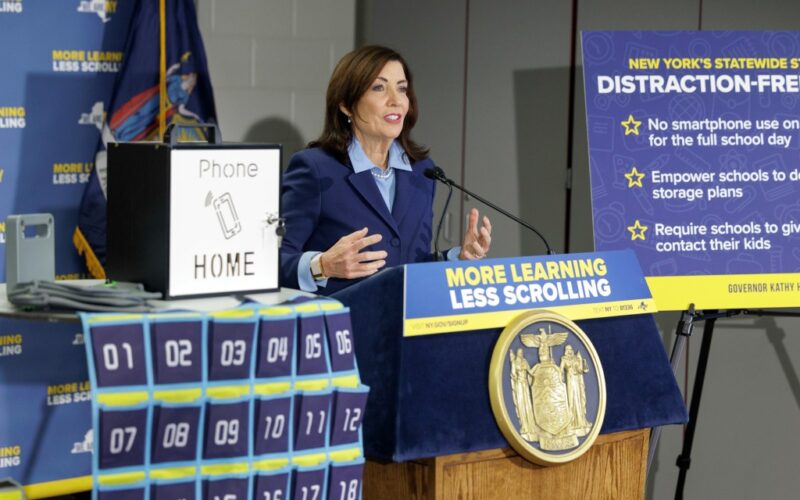A few months ago, my friends and I went out for lunch. But there was one key piece missing from our get-together: Conversation. Instead of talking, we were all thoroughly immersed in our phones. Eyes were glued down under the table, and it was as if we were all alone, despite being together. Right then and there, I felt a burning need to end this screen-driven isolation.
I soon published an article supporting a TikTok ban. I argued that the proposed legislation would do an enormous favor for my entire generation, a generation of unabashed social media addicts. And just a few weeks later, I had the opportunity to serve on a webinar panel — viewed by 2,000 school district superintendents — alongside Gov. Hochul.
We were discussing the impacts of cell phones in the classroom. My passion for saving my generation from the detrimental effects of TikTok had suddenly morphed into something even bigger, a mission — by forces greater than me — to preserve childhood itself against the insidiously destructive forces of smartphone dependency.
Initially, I confess that I was not entirely sold on the governor’s idea to bar smartphones from school. Despite my misgivings about TikTok, I did have a somewhat more accepting perspective on phones themselves. After all, a smartphone is so much more than a social media delivery platform: It’s also a calculator, an encyclopedia, and a calendar.
But during that webinar, the governor made a statement that has stuck with me ever since: She said she wants my generation to be the last generation glued to their screens. It was a refreshingly hopeful idea, one that made me keenly aware — by contrast — of the grim resignations that I’ve internalized. For, despite my love of my phone, I have long perceived a certain disconnectedness among my peers.
And I have come to believe, in some respects, that we are all done for, that our ability to learn, engage, interact, even live in the moment, is being indelibly compromised by our ubiquitous, pocket-sized computers.
On average, my generation — while at school — is spending more than an hour a day on phones. But imagine a world where just the opposite is possible. In a recent study researchers found that student visits to mental health services dropped 60% following the implementation of a school phone ban. That same study showed about a 45% decrease in bullying. At a time when — according to the CDC — nearly one in three high school students seriously considers suicide every year, this data shows us what an alternative world might look like, one without phones in schools.
When I was younger, and my family went out to eat, my mom would always comment on kids in restaurants staring at their screens. She would take pride in the fact that I never was one of those kids. No matter how much extra attention it took, she said I was always part of the conversation at the table, not a slave to a cartoon or a beginner’s video game.
When third grade rolled around, one of my closest friends, a year older than me, got a phone. It was a rite of passage; a marking of maturity; some sort of indicator that she had reached a level I had not. I went home that day and demanded a phone, but my mom simply laughed, saying that I shouldn’t be expecting one for a long time. I was furious at the time, but I’m greatly relieved in retrospect.
I realize why getting a phone can seem like such a mark of independence: We kids copy what adults around us do, and teachers and parents alike are always on their phones. Which is why it is especially imperative for very young children not to have phones at all, and at least not have them in schools.
The governor’s message on that panel was one of promise. And what I didn’t understand before…I think I fully get now: Removing cell phones from kids during school hours is not just about education; it’s about mental health, safety, and socialization.
Saving kids from their phones is not that complicated, but it is extremely difficult — if it’s left to the independent initiative of teenagers. What we need, as with the federal TikTok ban, is help from adults and lawmakers to stave off our technology addiction — and to give us back our childhoods, at least for the duration of the school day.
Weisfogel is a junior at Trevor Day School in Manhattan.








